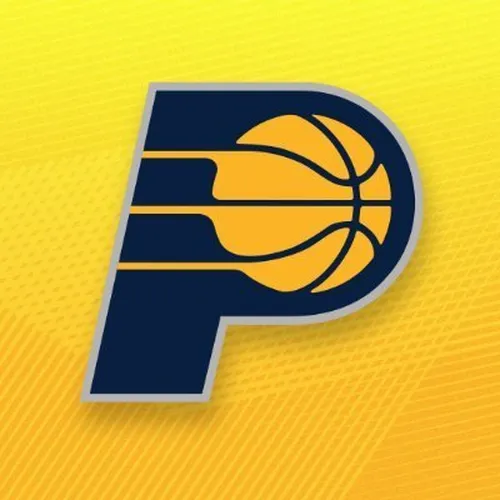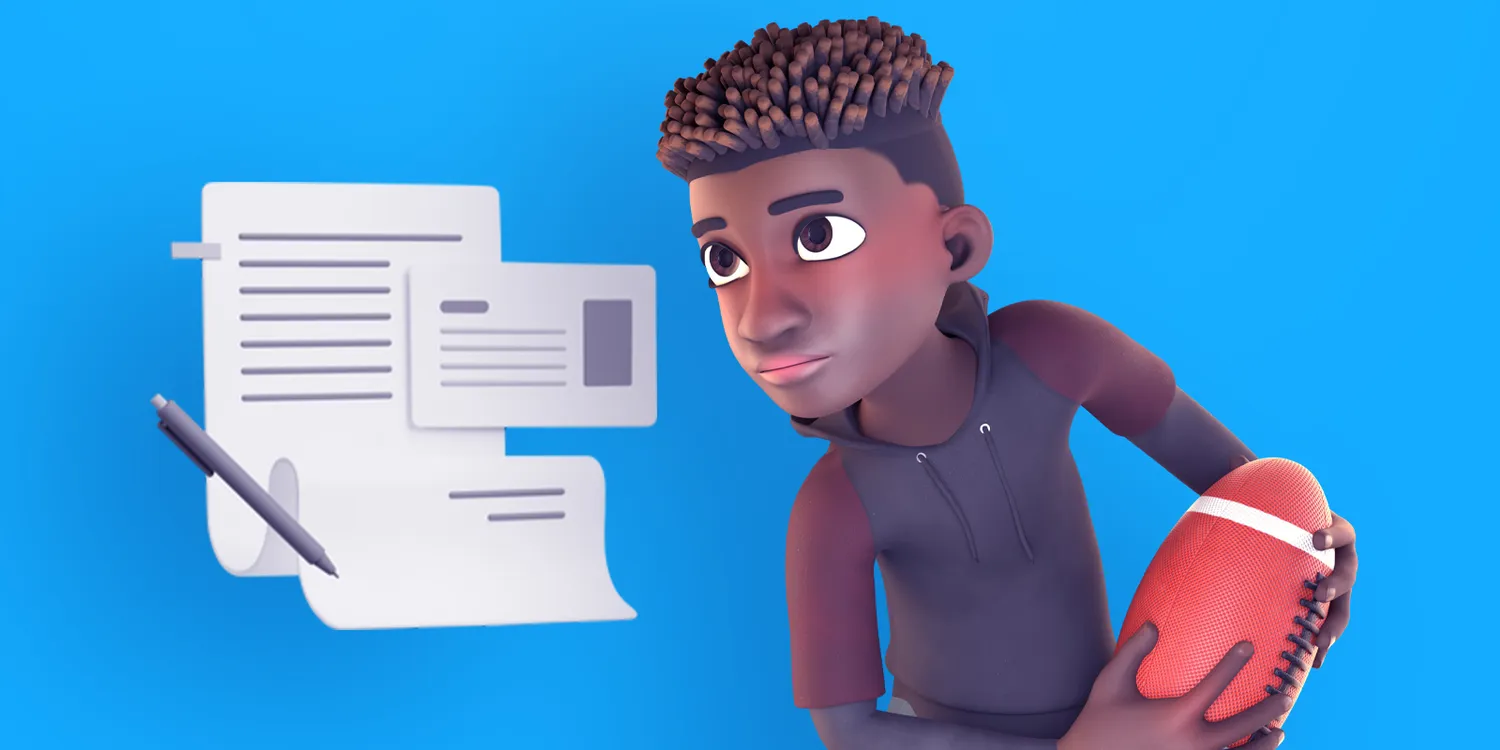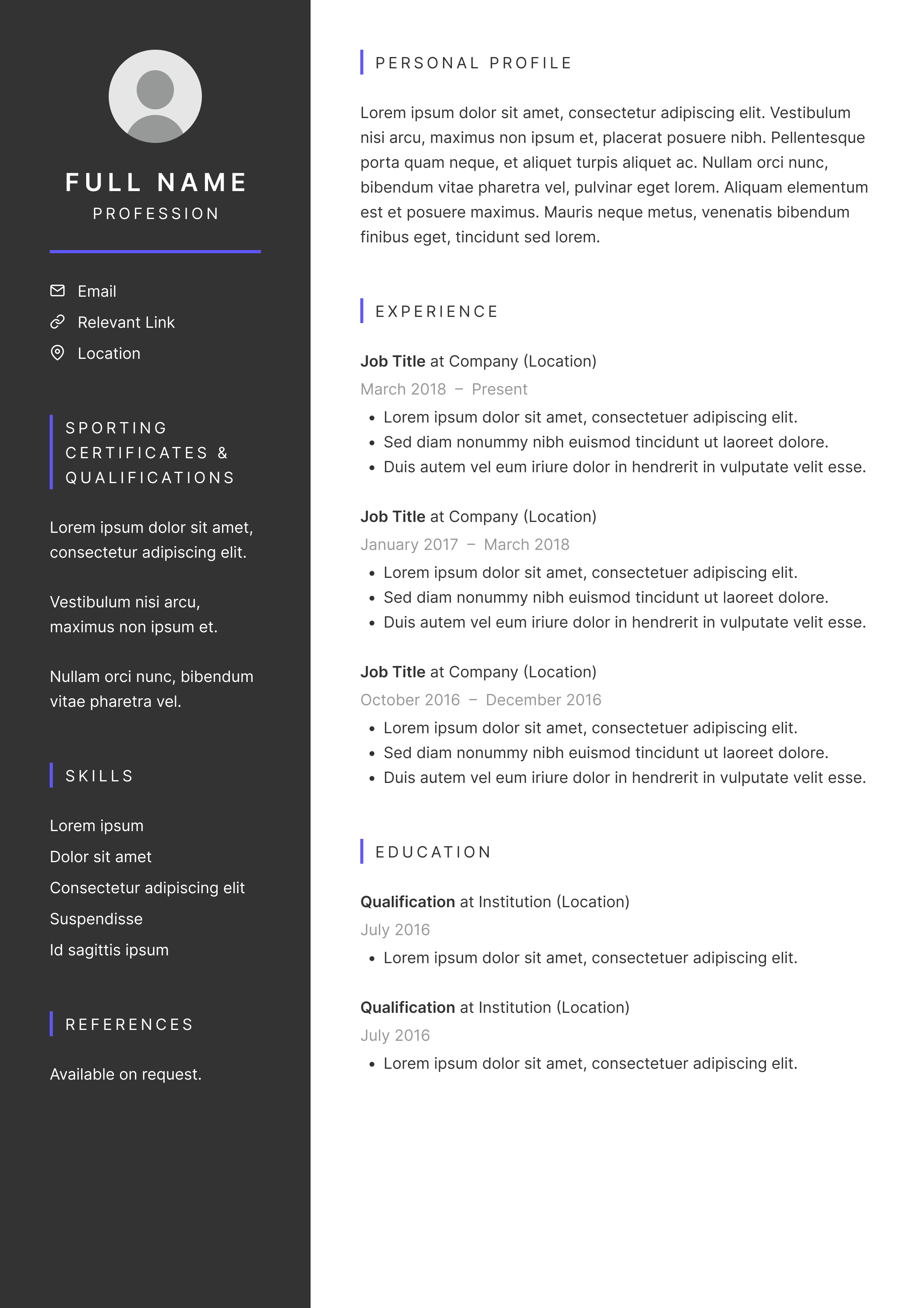







Create the ultimate resume/CV for a sports job (with examples)

Want to get hired in the competitive-by-nature industry of professional sports? Then you’re going to need a resume that’s modern, hard-hitting, and effective.
Fortunately, we know a few things about resumes and recruitment at Rebound. On this page, you’ll learn how to construct a winning resume that will increase your chances of getting hired in the sports industry. It doesn’t matter if you’re starting with a blank document or the finished deal — we’ll get your resume match fit in no time.
The ground rules
Keep these simple rules in mind to make your document the best it can possibly be:
Make yourself easy to contact. List your email address and phone number near the top of the document.
Use a Personal Profile or Objective paragraph. Put your best foot forward from the get-go.
Highlight achievements, not responsibilities. It’s much better to say, ‘Performed daily training with up to 40 student athletes’ rather than, ‘Trained student athletes’.
Talk about your own sporting achievements & certifications. Don’t have any? That’s fine. But if you do, list them somewhere on your resume to show off your sporting background.
List your past experience correctly. Start with the most recent job you’ve held (or your current one) and work down from there.
Don’t neglect your education. Whatever experience level you are, a hiring manager will expect to see a mention of your education on your resume.
One page, please. Unless you’re a senior professional with an overflow of experience, your resume shouldn’t exceed one page.
If you follow the above, you’ll be able to produce a valuable, concise resume that’s suitable for the sports industry. Here’s an example layout you can use for inspiration (it can also be useful to see where we’ve placed each section).

Click here to view the full resume as a PDF
Now that we’ve covered the basics, we’re going to run through each key section of the resume, one at a time. We’ll talk about what you should be doing and how you can tailor it to the sports industry.
All set? Let’s go!
Basic info
The very beginning of the resume. This is where you want to display your name, your town/city, your phone number, your email address, your profession, and (optional) a headshot.
We expect you know how to add most of those, so we’ll skip straight onto profession. What is it and why should you include it?
A profession on your resume is just a few words that sit underneath your name and describe your area of expertise, like, ‘Football Coach,’ ‘Digital Marketing Manager’, or ‘Senior Physiotherapist’.
The benefit of including one is that it instantly signals to the hiring manager that you’re a relevant candidate — and you can adjust it before each job application to stand out even more.
Let’s say you’re a marketing manager and you’re applying for a job in social media. You might have experience on socials, but your profession still says ‘Marketing Manager’. You can make your skill fit for the role even more apparent by updating your profession to ‘Marketing & Social Media Manager’ for that particular job.
Your headshot is pretty self-explanatory, and although it’s optional we think it’s absolutely worth including in marketing, creative, and on-camera jobs. These are the areas where a flair for design are valued the most, so a nicely-taken picture (no grainy selfies, thank you) is a good way to bring this to your resume.
Personal profile
A personal profile is an excellent introduction to a resume. It’s two or three well-structured sentences that sum up your expertise, your career to date, and what you’re looking for now.
It’s especially important if you don’t already have experience in the sports industry. While we wish it wasn’t the case, it’s not easy to enter a new industry. But, it gets easier with a personal profile because you can explain why you’re looking to move industries, and that can be crucial.
Here’s how a personal profile might look for a data professional seeking to enter sports:
I am a seasoned data & analytics manager looking to combine my five years of experience in corporate banking with my lifelong passion for competitive sports. Throughout my career I’ve lived in SQL and Tableau, and know I can bring this expertise to COMPANY NAME to help inform your data department from day one and grow the team’s success with smart decision-making.
In a few short sentences we’ve:
Introduced the candidate’s level of experience and specialism
Highlighted that they don’t have existing sports experience but are interested in the industry
Made it clear what languages/software the candidate knows
Added a clear value proposition as to why the company should hire this candidate
See why a personal profile can pack such a punch? Try writing one for yourself and see how it goes!
Past experience
Ah, the biggie. Your past experience should take up the majority of your resume; it’s the clearest indication to an employer on whether or not you can do the job, after all. The exception to this is if you’re a new graduate, which we’ll be touching on later.
First, let’s talk layout. For each job you list, stick to an established formula like this:
Job Title at Company Name (Location)
Date Started - Date Ended (Use ‘Present’ if describing your current job).
Key achievement / figure #1
Key achievement / figure #2
Key achievement / figure #3
Notice how we’ve asked you to write your key achievements in the experience section, not just your responsibilities? This is important to follow and can be the difference between a good and a great resume.
Let’s imagine you’re a business development manager with a focus on driving revenue. Here’s a set of bullet points that would jump off the page at a hiring manager:
Helped increase revenue in my department by 46% over one year
Learned the full sales lifecycle, to the point where I was able to close five separate deals independently
Received an average satisfaction score of 93% from our clients, the second highest in the department.
Do you see how each bullet point is rich in detail and numbers, and gives the hiring manager plenty to get excited about?
Well, here’s how you shouldn’t structure your experience section:
Increased revenue
Closed deals with clients
Learned good customer service
The second example is so much more vague and bland than the first, so use achievements and figures wherever you can!
And remember, your most recent (or current) job should be listed at the top of this section, followed by the next most recent, and so on.
Sporting experience
It goes without saying that actual sporting qualifications and certificates go a long way in finding a sports job — especially in hands-on roles like coaching, physio, or refereeing.
While a job in IT won’t care that you’re a qualified amateur football coach, a hiring manager in sports will. They’ll also want to know about any certifications you’ve picked up around health and first aid. CPR training is often required in sports coaching jobs, as are background checks to ensure it’s safe for you to work with children (called DBS checks in the United Kingdom).
If you have one or more of these, then include a small heading under your experience section, or in your resume sidebar, to display these to the hiring manager. It won’t take up much room and could be essential to the job you’re applying to.
Education
As we mentioned at the start of this article, no resume is complete without a mention of your most recent educational qualification. However, we know this is going to look different based on where you are in your career, so we’ve split this section into two parts.
For senior professionals:
Keep your education section brief. At this point in your career an employer is going to be ten times more interested in what you’ve done in past jobs as opposed to what you studied. Use the following format to keep this section nice and trim:
Degree Type and Subject at School Name (Location)
Date Started - Date Ended
List your GPA in one bullet point.
List any other relevant information in additional bullet points (sporting achievements, special honors, etc).
And that’s all you need to do! The only thing worth mentioning is that if your professional experience is from outside the sports industry, but you had originally studied sport in school, then it’s worth adding a few more bullet points to this section.
For junior professionals:
When you’re at the start of your career, your education section is likely to form a major part of your resume. In the absence of professional experience it’s the best fall-back option to show an employer a) what you know and b) that you can commit to something long-term.
You can present it in exactly the same format as we recommend for senior candidates (scroll up for the example if you missed it). The only difference is that you want to aim for at least five or six bullet points. Think about…
What you learned. Did you pick up any new coaching methods, software programs, or techniques?
What you achieved. Were there any classes you excelled in particularly, or projects where you were recognized as an outstanding contributor?
What you did with your time away from the classroom. Did you have any extracurricular hobbies? (Bonus points if they involved sport!)
See if you can build out a compelling education section from those prompts. The last thing you want is a resume with empty space on it, so make sure to utilize your education, hobbies, skills, sporting achievements, and personal projects to make sure that you’re presenting yourself as an engaging and productive individual.
Skills
A skills section is a great addition to any resume, but especially if you’re a junior candidate. It can fill empty space on the document and serves a real benefit in displaying your strongest skills to an employer.
But what should you highlight in a sports resume? The most important thing to keep in mind is that all of your skills should tie into the sort of jobs you’re applying to.
If you’re applying in coaching / athlete development, consider listing skills like:
Exercise & training schedules
Leadership & mentoring
League or sport regulations
Mental preparation & readiness
Nutrition & diet plans
If you’re applying in a business / marketing discipline, consider the techniques and programs that you’re fluent in:
Data visualization
Digital & brand marketing
Financial analysis & end-of-year reports
Purchasing & vendor management
Video direction & production
If you’re applying in leadership / people-management, consider the scenarios that are likely to come up:
Budgeting & forecasting
Business strategy & execution
Personnel development
Recruiting & onboarding
Team management
And here’s a pro tip: to make a real impact, you can customize your resume before each application. Take a look at the description of the role you’re applying for and see what skills are requested. If any of these match your profile, then you should absolutely be listing them on your resume — it’ll jump out at the hiring manager!
Conclusion
With that, we’ve covered all of the key sections that go into a sports resume and how to structure them. We appreciate that they won’t apply to everyone reading, but we hope it’s given you some direction to create or improve upon your current version.
Remember these key points and you won’t go wrong:
Your resume should have everything that an employer needs to consider you for the role they’re hiring for.
Your resume should accurately sum up who you are, what education you’ve undertaken, and what employment positions you’ve held.
Ultimately, a recruiter wants to hire someone that can do their job opening well. Make it clear to them that you can do this and you’ll be off to a winning start.
Ready to create your sports resume?
Now it’s time to put this information into practice. Stand out, sell yourself, show personality, and make it clear to the hiring manager that you’re the person for the job.
Once you’re done, hit our jobs feed for thousands of active vacancies in the sports industry. We have collections for all the major sports and competitions including Motorsport Jobs, Football Jobs, NBA Jobs, NFL Jobs, and MMA Jobs so finding your dream role has never been easier.
And if you need help creating a cover letter for a sports job, we have you covered too.
Good luck out there.
























